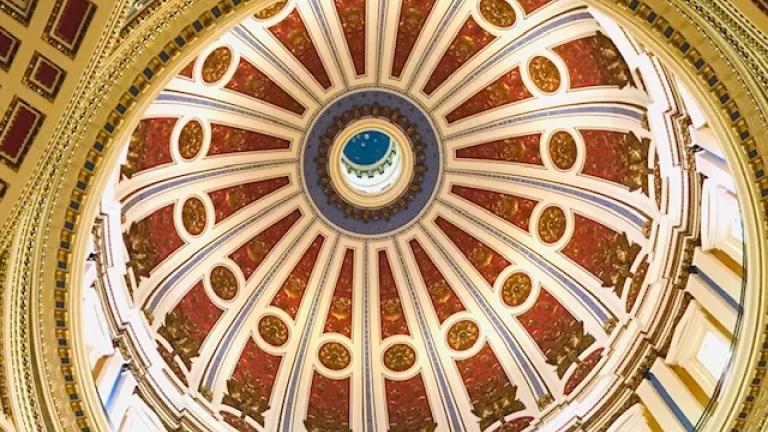RGGI in the PA Legislature, or Welcome to the Terrordome

This is the third blog in a three-part series on the Pennsylvania Department of Environmental Protection's proposed regulation to limit carbon pollution from power plants and participate in the Regional Greenhouse Gas Initiative (RGGI). Part I summarizes the DEP's proposal and the Environmental Quality Board 's role in advancing it. Part II discusses RGGI's record of success and its projected impacts in Pennsylvania.
Shortly before the Pennsylvania Environmental Quality Board voted to advance the DEP's carbon limits proposal into a formal rulemaking, the state Senate joined the House in passing House Bill 2025, a bill to strip the DEP of its legal authority to regulate carbon dioxide pollution. At some point, the House will send the bill to Governor Wolf, who has said he will veto it. The passage of HB 2025, and the way the Senate passed it—memorably summarized by Senator Vincent Hughes as "welcome to the Terrordome"—are a fair distillation of the Republican-controlled General Assembly's approach to RGGI, and to climate change generally since 2009.
Background: the General Assembly's Record on Clean Energy and Climate Action, 2000 – Present
2000 – 2008
In the decade before Harrisburg was seduced by fracking, Pennsylvania enacted three significant pieces of clean energy and climate legislation. The Alternative Energy Portfolio Standards Act of 2004 (AEPS) set goals (decent ones by 2004 standards) for the purchase of renewable energy and other "alternative" generation by electric utilities and retail suppliers. Act 129 of 2008 required utilities to establish efficiency and conservation programs for customers. And the Climate Change Act of 2008 charged the DEP with producing triennial reports on the impacts of climate change in Pennsylvania and recommend mitigation strategies.
2009 – Present
Since 2009, the General Assembly has neither updated the AEPS or Act 129 nor passed clean energy or climate legislation of similar ambition. Act 13 of 2012 did update the Oil and Gas Act of 1984 (if not enough, or always legally) for the fracking age. And the General Assembly passed three good bills during the 2017-18 legislative session: Act 40 of 2017, which pushes utilities and retail suppliers to buy in-state solar generation for AEPS compliance; Act 30 of 2018, which authorizes municipalities to establish commercial property assessed clean energy (C-PACE) programs; and Act 58 of 2018, which authorizes electric and gas utilities to propose revenue decoupling and other "alternative ratemaking methodologies."
Generally, though, Pennsylvania's energy policy over the last decade has been heavily biased toward fossil fuels, especially shale gas. Not only has the General Assembly refused to pass a severance tax on gas extraction, making Pennsylvania the only major gas-producing state without one; it has passed two massive tax credits for petrochemical development, one in 2012 and another this year. The legislature also established a tax credit to support waste coal power plants.
House Bill 2025 and Senate Bill 950
In the spring of 2019, Republican leadership in the House blocked "Restore Pennsylvania," Governor Wolf's latest severance tax proposal. Wolf and the General Assembly then reportedly began to discuss RGGI as a possible alternative source of funding for infrastructure projects. Nothing came of those talks, however, and in their wake Governor Wolf directed the DEP to develop a RGGI-compatible carbon limits regulation. The response of the House and Senate was to introduce HB 2025 and SB 950, which I discussed in a blog in June and in a letter to Senators before last week's vote. For purposes of this blog, the key harmful language in these bills is as follows:
Prohibition. – Except for a measure that is required by Federal law, the [DEP] may not adopt a measure or take any other action that is designed to abate, control or limit carbon dioxide emissions, including an action to join or participate in a State or regional greenhouse gas cap-and-trade program, including the RGGI, nor may the department establish a greenhouse gas cap-and-trade program, unless the General Assembly specifically authorizes such a measure or action by statute that is enacted on or after the effective date of this section.
At a time when more than two-thirds of Pennsylvanians want their elected officials to take strong action to reduce greenhouse gas emissions, this language unambiguously blocks the DEP from taking any action to regulate carbon pollution absent further legislation.
Senate Majority Leader Jake Corman argued on the Senate floor that HB 2025 is not about whether Pennsylvania should join RGGI or regulate carbon pollution, but about "whether the legislature should have a say in whether we join RGGI or not." But the legislature does have a say. The General Assembly passed the Air Pollution Control Act, which authorizes the DEP's proposed regulation, and the General Assembly will have an opportunity to disapprove the proposal under the Regulatory Review Act. And of course, if two-thirds of legislators want to do the opposite of what two-third of Pennsylvanians want them to do, they can vote to override a veto of HB 2025.
HB 2025 is about the legislature's having its way—by all appearances, to do nothing about climate change. Because if HB 2025's authors wanted to engage constructively in how Pennsylvania should reduce greenhouse gases, the bill would include a legislative plan for doing that. Instead, it just blocks any plan the DEP might formulate under the current Air Pollution Control Act.

Welcome to the Terrordome
In the last ten months, the House and Senate Environmental Resources and Energy Committees have held seven hearings on RGGI, HB 2025, and SB 950. Approximately forty of the testifier slots went to RGGI opponents; the DEP got to speak four times, and other RGGI and climate action proponents eight times.
So maybe it should not have been a surprise when Senator Joe Pittman "moved the previous question" before the Senate's September 9 vote on HB 2025. This parliamentary maneuver, known as the Senate's "nuclear option," cut off debate: Democrats could not force a discussion on six amendments they'd filed. One would have recognized climate change as real and a result of human activity. Another replaced the text of HB 2025 with the text of SB 15, a bill that would direct participation in RGGI and use RGGI proceeds to do what HB 2025 does not do: support workers and communities affected by coal plant retirements, which are happening with or without RGGI.
The last time the nuclear option was deployed in the Senate, it was to cut off members defending general assistance, which (before the legislature defunded it) provided about $200 per month in cash assistance to the neediest Pennsylvanians.
HB 2025 passed 33 to 17. Afterward, Democrats took the floor to say what they'd wanted to say before the vote. (The video is available here). Senator Hughes introduced his comments with "welcome to the Terrordome," a reference (I think) to the 1989 Public Enemy song of the same name. I understand that song to be about power and survival (especially the survival of Black people in a society infected with racism) and Senator Hughes made clear that he was talking about the way that power (here Pennsylvania's powerful fossil fuel industry) sometimes reacts when threatened: "it stops democracy in its tracks."
Pennsylvania needs governance that reflects the will of Pennsylvanians and needs to address climate change. If we get the former we'll do the latter.


